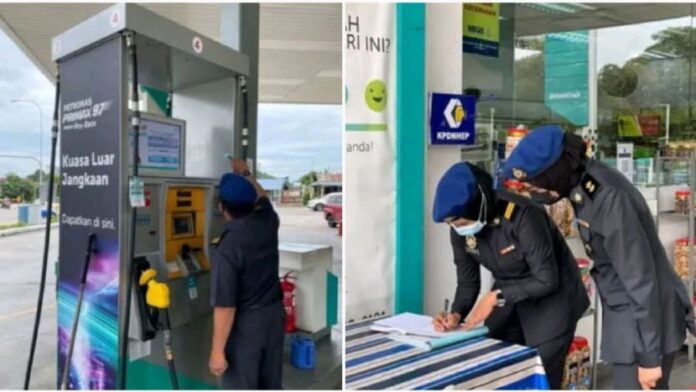JOHOR BAHRU: The Johor Department of the Ministry of Domestic Trade and Consumer Affairs of Malaysia has pledged to strengthen enforcement against operators selling RON95 petrol to foreign-registered vehicles in the state.
Responding to CNA’s enquiries on Monday (April 4), the department’s director, Mohd Hairul Anuar Bohro, said his officers would continue to be deployed locally to ensure drivers and operators comply with regulations.
“Enforcement officers in the state … will continue to monitor and inspect to ensure that there is no illegal sale of regulated items, especially petrol and diesel, in Johor,” he said, adding that the operation involved about 200 people.
Mr Mohd Hairul Anuar added: “Severe action will be taken if a business commits offences relating to regulated goods under the Control of Supply Act 1961.”
Malaysia has banned the sale of RON95 petrol to foreign registered vehicles since August 1, 2010. RON95 provides subsidies for locals.
Foreign registered vehicles can be refueled with RON97 gasoline. The vehicles can also be refueled with diesel fuel, but only once a day, with a 20-litre limit at any petrol station within 25km of the Malaysia-Singapore land border.
Following the reopening of the land border between Johor and Singapore on April 1, a photo of an individual filling a Singapore-registered car with RON95 petrol at a kiosk in Johor Bahru went viral on social media.
Former prime minister Najib Razak, who shared the photo on his Facebook, wrote that allowing a foreign-registered car to top up the 40-litre RON95 would cost the government RM68 (S$21.90).
During the week of March 31 to April 6, RON95 will be sold at RM2.05 per litre, while RON97 will retail at RM3.91 per litre. Diesel is priced at RM2.15 per litre.
Mr Mohd Hairul Anuar told CNA that he knew the photo had gone viral on social media and that his department had taken “proactive and proactive actions” to monitor petrol stations, especially those located near the border.
“Based on our monitoring reports and inspections by law enforcement officers from station to station, it is clear that there is no reported illegal activity and that gasoline is being sold satisfactorily,” he added.
A banner reading “Welcome Back to Malaysia” was erected at a Gemini gas station in Johor Bahru. (Photo: CNA/Amir Yusof)
CNA visited four petrol stations in Johor Bahru, near the Woodlands Causeway, on Monday afternoon and observed that no Singapore-registered cars were refueling with RON95 petrol.
At a Shell petrol station along Jalan Lingkaran Dalam, a petrol station attendant was seen walking around the petrol station to ensure drivers with foreign-registered cars were not buying RON95s.
“Only a few need me to remind them, but most drivers are aware of the law,” said the Shell employee, who declined to be named.
A sign reminding foreign registered car owners about the laws of filling up at petrol stations in Malaysia. (Photo: CNA/Amir Yusof)
At Petronas petrol stations in Jalan Yahya Awal, each petrol station has a slogan outlining that the purchase of RON95 petrol by foreign-registered vehicles is “strictly prohibited”.
On Sunday afternoon, Domestic Trade and Consumer Affairs Minister Alexander Nanta Linggi warned that petrol station operators caught selling subsidised RON95 petrol to foreign-registered vehicles could be fined up to $200. A fine of RM643,000 (S$643,000).
In a statement, the minister also ordered all state sector offices that border Singapore and Thailand to “intensify monitoring and inspections and take stern action against any party that violates the law”.
Under the Supply Control Act 1961 and the Supply Control Regulations 1974, if convicted, individuals can be fined up to RM1 million or jailed for three years, or both, while entities and companies can be fined up to RM2 million.






